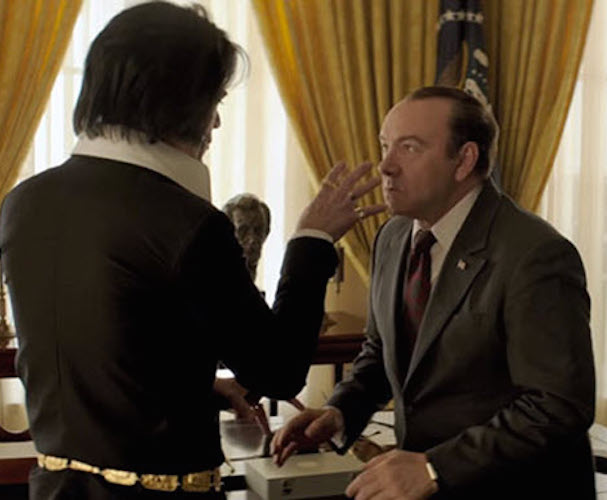Film Review: “Elvis & Nixon” — Together Again
These two detached human beings connect in their joint emotional poverty, and that dramatic depth anchors this funny, charming, yet somewhat fluffy film.
Elvis & Nixon, directed by Liza Johnson. At Kendall Square Cinema, Cambridge, MA

Michael Shannon (Elvis) and Kevin Spacey (Nixon) in “Elvis & Nixon.”
By Paul Dervis
Kevin Spacey returns to the big screen after spending the better part of the last three years anchoring, with Robin Wright, Netflix’s political-knives-always-sharpened drama House of Cards. And that was no doubt excellent preparation for playing the most despised American President in my lifetime, ‘Tricky Dick,’ in Liza Johnson’s highly entertaining Elvis & Nixon.
But, as delicious as Spacey is here, the film belongs to Michael Shannon.
Shannon, who was a regular on another cable drama, Boardwalk Empire, and has a starring role in the recent release Midnight Special, delivers a funny, complex, and absurdly non-linear King of Rock and Roll here.
These two actors tackle a pair of national icons, yet never get caught up in rote imitation. How many times have Nixon portrayals been on automatic — with all the twitches and mannerisms we so love to hate? And Elvis…there’s been a half century of inane imitators in film and Las Vegas. Somehow, Shannon’s Presley manages to escape the cliches. In fact, one of the funniest moments in the film is when Presley is waiting in an airport and a couple of Elvis imitators approach him, thinking he is one of them. They rate his persona, barely giving it a passing grade. Shannon’s Presley never challenges them; he accepts that he is trapped, the unwilling (and profitable) inspiration for countless fantasists. It is very funny and quite sad. And Elvis & Nixon is chock full of these quirky, illuminating moments.
The premise of the movie, written by the trio Joey and Hanala Sagal, (she was one of the writers for TV’s classic Fernwood Tonight) and Cary Elwes, is imagining what happened behind closed doors at the White House between these two fabled eccentrics when they met in the early 1970s.
The meeting really happened. There is a famous photo of them shaking each other’s hands. But it was before Nixon decided it would be a good idea to tape every conversation in the Oval Office, which the writers, with great glee, point out.
The film opens with Elvis, in some kind of stupor, lounging in his TV room (really a 5 TV room — he has multiple sets playing different channels simultaneously). He sits watching various protests on one of the screens …then picks up a handgun and blows the TV away. After all, he’s a true American. He points out in another scene that under communism there could be no Elvis Presley.
The King, who has received numerous honorary badges from various local law enforcement facilities, longs for the real thing. He wants to be an undercover agent ‘at large’ for the Feds. He sees himself as the perfect double agent for the government, able to infiltrate every group from the Black Panthers to the Rolling Stones. And Nixon is just the fellow to make that kind of sly subterfuge happen. So off to Washington DC to make the dream come true. Much to the shock of security, Elvis pulls up to the White House gate.
Nixon wants nothing to do with the superstar and turns down the requested meeting. Elvis is despondent; he finds comfort by gulping down M&Ms. But a couple of White House staffers get an idea and make an appeal to Nixon’s daughters. One of them has to be a fan. And they are right. Julie pressures her dad to meet her idol.
And the meeting is set up. The White House aides are giddy with the PR possibilities of a partnership between the two. Presley may be just what their boss needs to win over the Woodstock Generation. Still, they fear these two legends will clash. Can these two mega-egos co-exist in the same space?
How wrong they are. Presley and Nixon are like, as they say, two peas in a pod.
Near the end of the film, after ‘Elvis has left the building,’ (the famous line is uttered, with full humorous effect, by one of the aides) a smiling Nixon turns to one of his staffers and proudly announces that Elvis thought he was “cool.” Precious!
In its lighthearted way, Elvis & Nixon nails the dehumanization at the core of pop culture adulation. No one does anything but swoon and re-swoon over Presley. Shannon suggests what a tiresome and alienating burden that is. His Presley is a simple, almost illiterate, young boy stuck in the aging body of a superstar. We laugh but also cringe at his helplessness, the pathos of isolation in the midst of hero-worship.
Spacey’s Nixon is a cloistered Richard III, detached from the world outside his four walls, utterly dependant on the perceptions of those around him. His bitterness about people who can handle glamour, easy fame, power, and fortune with ease is palpable. These two detached human beings connect in their joint emotional poverty, and that dramatic depth anchors this funny, charming, and yet somewhat fluffy film. As Shannon says — just once during the movie — “Thank you. Thank you very much.”
Paul Dervis has been teaching drama in Canada at Algonquin College as well as the theatre conservatory Ottawa School of Speech & Drama for the past 15 years. Previously he ran theatre companies in Boston, New York, and Montreal. He has directed over 150 stage productions, receiving two dozen awards for his work. Paul has also directed six films, the most recent being 2011’s The Righteous Tithe.
Tagged: Elvis & Nixon, Elvis Presley, Kevin Spacey, Liza Johnson, Michael Shannon, Paul Dervis
